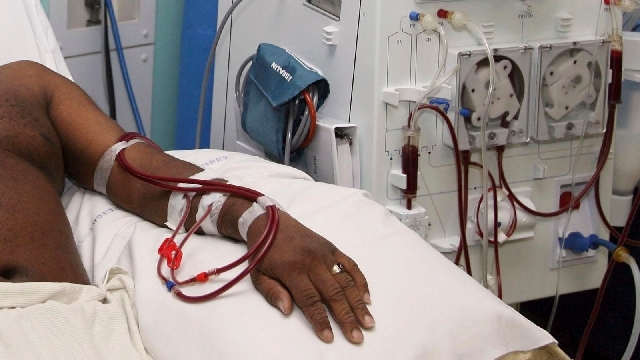The Dialysis Center at the Upper East Regional Hospital in Ghana faces imminent closure due to a critical shortage of essential consumables, a direct consequence of the government’s failure to reimburse the facility for services rendered under the National Health Insurance Scheme (NHIS). Dr. Emmanuel Akatibo, the center’s director, has voiced grave concerns about the situation, highlighting the financial strain the center has been under since its inception in mid-2024. Despite the government’s public commitment to providing free dialysis treatment under the NHIS, the lack of a concrete funding mechanism has left the center operating without receiving the promised reimbursements, forcing it to deplete its resources and putting its continued operation in jeopardy.
The financial predicament stems from a disconnect between the government’s well-intentioned policy announcement and the practical implementation of the funding mechanism. While the government declared dialysis treatment free under the NHIS, it failed to establish a clear and effective system for reimbursing healthcare providers, leaving centers like the one in the Upper East Region struggling to cover operational costs. This lack of foresight and planning has created a precarious situation where the very availability of life-saving dialysis treatment is now threatened, potentially jeopardizing the health and well-being of numerous patients relying on the center.
The center’s management has explored various options to address the funding shortfall, including briefly considering charging patients for some services to generate revenue and avoid complete closure. However, this move proved unsustainable and was quickly reversed in adherence to the government’s policy of free dialysis. This short-lived attempt to recoup costs highlights the desperate measures the center has been forced to consider in the face of mounting financial pressure and the absence of timely government support. The decision to revert to free dialysis, while ethically commendable, further exacerbated the center’s financial vulnerability, accelerating its descent towards potential closure.
The funding crisis attracted public attention following a social media post by former Upper East Regional Minister, Tangoba Abayage, alleging that the center was charging patients for services, contradicting the government’s promise of free treatment. Dr. Akatibo clarified the situation, explaining the center’s temporary and ultimately abandoned attempt to charge patients as a last-ditch effort to prevent closure. He emphasized the need for greater clarity and transparency from the government regarding the financing of the free dialysis program, highlighting the disconnect between policy and implementation that has led to this critical situation.
The potential closure of the Dialysis Center poses a significant threat to kidney disease patients in the Upper East Region, many of whom depend on the facility for essential life-saving treatment. Access to dialysis is crucial for individuals with end-stage renal disease, and the absence of this service could have devastating consequences for their health and survival. The center’s closure would not only disrupt their treatment regimen but also force them to seek alternative options, which may be unavailable, inaccessible, or unaffordable, further exacerbating their health challenges and placing an undue burden on their families and communities.
Dr. Akatibo has issued an urgent appeal to the government and relevant stakeholders to intervene and address the financial challenges facing the dialysis center. He stresses the critical need for immediate financial support to ensure the center’s continued operation and prevent the disruption of life-saving treatment for vulnerable patients. The plea underscores the gravity of the situation and the potential human cost of inaction, highlighting the shared responsibility of the government and healthcare providers to ensure the accessibility and sustainability of essential healthcare services for all citizens, particularly those with life-threatening conditions. The future of the dialysis center, and the lives of the patients it serves, hangs in the balance, awaiting a decisive and timely response from the authorities.














